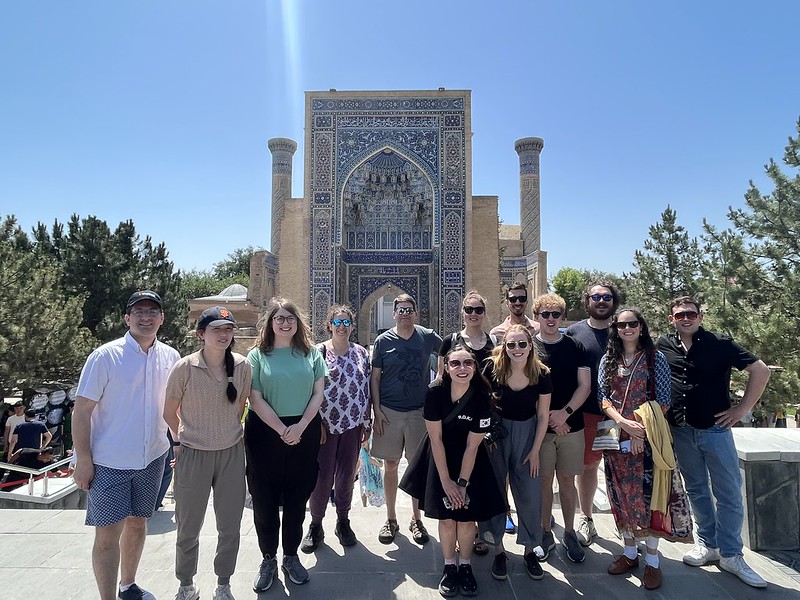
Fletcher Students and Faculty Travel to Kazakhstan and Uzbekistan to Study Russia’s Influence in Central Asia
By Alexander Thomas, alumnus of The Fletcher School
Central Asia is once again playing a crucial role in global geopolitics. As a result of the war in Ukraine, the region has become a focus of competition between the contemporary power triumvirate of Russia, China, and the United States, over economic opportunities, access to abundant natural resources, and regional leverage.
Russia’s invasion of Ukraine tarnished its image across the region, causing a ripple of uncertainty through Kazakhstan, Kyrgyzstan, Tajikistan, Turkmenistan, and Uzbekistan. Yet the region’s historically close cultural, economic, and security ties with Russia have prevented the five Central Asian countries from drifting too far from its sphere of influence. Meanwhile, China’s Belt and Road Initiative has been productive for the region, but has also raised immense suspicion toward China in Central Asia.
The United States, by contrast, is seeking to capitalize on the changing trends in the region. U.S. Secretary of State Antony Blinken’s recent visits to Kazakhstan and Uzbekistan underscore America’s renewed interest in Central Asia. However, skepticism over U.S. commitment to the region has severely tempered expectations by the five countries, particularly after the chaotic U.S. withdrawal from Afghanistan. These nations, seeking sovereignty, self-determination, and a respect for territorial integrity, are facing increasing pressure to navigate a complex geopolitical terrain where both Russia and China cast long shadows.
From May 9-19, 2023, 10 students from The Fletcher School participated in a study trip to Central Asia to explore these shifting geopolitical dynamics and elucidate the changing role of Russia in the region. Alongside three Fletcher professors, the group traveled to Kazakhstan and Uzbekistan to meet with university scholars, think tank experts, and government officials alike.
MALD 2023 student Maricarmen Corte said, “Joining the Central Asia study trip provided me the opportunity to extend my prior involvement with the region and delve into the intricate web of technological advancements catalyzed by the COVID-19 pandemic and the Ukraine-Russia war.”
The participants spent the first three days of the study trip in Astana, Kazakhstan, where they met with professors of Nazarbayev University, researchers of the Kazakhstan Institute for Strategic Studies, representatives of the Astana International Financial Center (AIFC), and Maulen Ashimbayev, Chair of the Senate of the Parliament of the Republic of Kazakhstan and Fletcher alumnus, to name a few. They also participated in a roundtable with the U.S. Ambassador to Kazakhstan Daniel Rosenblum and other officers at U.S. Embassy Astana to present their preliminary research findings and discuss U.S. strategic interests in Kazakhstan and Central Asia.
After departing from Kazakhstan, the participants of the study tour traveled to Tashkent, Uzbekistan for an intensive week of academic activities and meetings with government representatives. They visited the University of World Economy and Diplomacy (UWED), where they met with Sodiq Safoyev, Rector of UWED, First Deputy Chairman of the Senate of the Oliy Majlis of Uzbekistan, and former Minister of Foreign Affairs of Uzbekistan. They also participated in a roundtable on “Regional Cooperation and Stability in Central Asia” with research fellows and professors at the UWED Institute for Advanced International Studies.
Furthermore, the study trip participants met with Ambassador Jonathan Henick and other officers at U.S. Embassy Tashkent to discuss U.S. strategic objectives toward Uzbekistan. They also met with Ambassador Vladimir Norov, Director of the International Institute of Central Asia and former Minister of Foreign Affairs of Uzbekistan; Aziza Umarova, Head of the Delivery Unit at the Agency for Strategic Reforms under the President of Uzbekistan; and other practitioners.
In addition to formal research and meeting with high-profile officials, the students and faculty also had the unique opportunity to engage in cultural activities throughout their time in Central Asia. In Astana, they attended an opera performance at the Kazakh Opera House, toured the Baiterek Tower and the Museum of the First President of the Republic of Kazakhstan, and visited the National Museum of the Republic of Kazakhstan, the EXPO 2017 Nur Alem National Pavilion, and the Astana Grand Mosque. In Uzbekistan, they toured Tashkent and took a day trip to Samarkand, where they saw the Amir Temur Mausoleum Gur-i Amir Сomplex, the Registan, the Ulugh Beg Observatory, the Bibi-Khanym Mosque, and the Siyob Bazaar.
Reflecting on the experience, MALD 2023 student Ali Battat said, “The biggest surprise for me was the difference in perception of Central Asia from afar and the realities on the ground. The most obvious example was how I thought, given everything I had read and heard, that Central Asian states would be desperate to pivot away from Russia. As soon as I landed there, though, I realized that very little had changed and Russia still maintained deep infrastructure and cultural ties with the region. These links made it impossible to achieve a complete decoupling in a short period of time.”
The research findings from the study trip are set to be finalized in December. However, one thing was clear throughout the experience: the relationship between Russia and Central Asia has not backslid as much as Western experts and policymakers seem to think. Economic, social, cultural, and political ties remain strong. Despite the United States working to increase its engagement and China’s expanding economic initiatives in the region, the legacy of the Soviet Union means that Russia still commands significant influence in the five Central Asian countries. The Russia-Ukraine war has hardly damaged that influence, if at all. Even with Kazakhstan and Uzbekistan seeking a multivector foreign policy approach, it is hardly a zero-sum game.

